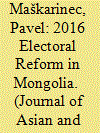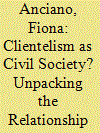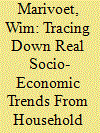|
|
|
Sort Order |
|
|
|
Items / Page
|
|
|
|
|
|
|
| Srl | Item |
| 1 |
ID:
159758


|
|
|
|
|
| Summary/Abstract |
This article tests the effects of a new electoral system that was introduced in Mongolia for the June 2016 elections. The decision to implement a first-past-the-post (FPTP) system instead of a mixed-member majoritarian (MMM) system, which was first and last used in the previous elections of 2012, was due to the April 2016 ruling of the Mongolian Constitutional Court on unconstitutionality of the list tier as one of the mechanisms for distributing seats within MMM. Through an analysis of national- and district-level results, this article addresses the question whether electoral competition at the district level was consistent with Duverger’s law and resulted in the restoration of bipartism, which had been disrupted in 2012 due to the use of MMM.
|
|
|
|
|
|
|
|
|
|
|
|
|
|
|
|
| 2 |
ID:
159763


|
|
|
|
|
| Summary/Abstract |
This article presents an analysis of South Korea’s strategic choices over the Asian Infrastructure Investment Bank (AIIB), the Trans-Pacific Partnership (TPP), and the Terminal High Altitude Area Defense (THAAD) in light of the Sino–US competition in post-Cold War East Asia. South Korea’s puzzling behavior here represents Seoul’s hedging strategy against the uncertain future of the Sino–US competition in East Asia. The driving force of South Korea’s hedging behavior is Seoul’s dual concerns about being excessively dependent on the USA for its security at the time of China’s rapid rise on the one hand and being pulled into a growing China’s sphere of influence at the expense of traditional US–ROK security ties on the other. Reflecting Seoul’s prudent balancing acts between the two superpowers, South Korea’s hedging often results in apparently indecisive and underdetermined strategic choices in the face of the intensifying Sino–US competition. Nevertheless, South Korea’s hedging strategy allows Seoul to deepen extensive economic ties with Beijing while maintaining a traditional security alliance with Washington. The hedging behavior of South Korea, which is uniquely positioned as a strategic partner of rapidly rising China as well as a key security ally of the rebalancing USA, sheds important light on the behavior of middle powers in alliance politics, which has largely been neglected in the current literature.
|
|
|
|
|
|
|
|
|
|
|
|
|
|
|
|
| 3 |
ID:
159762


|
|
|
|
|
| Summary/Abstract |
This article, building on analyses from the global south, attempts to reframe democratic expectations by considering where previously maligned practices such as clientelism may hold moments of democracy. It does so by comparing the theory of civil society with that of clientelism, and its African counterpart neo-patrimonialism. It argues that clientelism as civil society may fulfil democratic tasks such as holding the (local) state accountable, strengthening civil and political liberties and providing channels of access for previously marginalised groups. Clientelism is not necessarily a reflection of imposed power relations but, at times, can demonstrate a conscious political strategy, to generate development, on the part of its protagonists.
|
|
|
|
|
|
|
|
|
|
|
|
|
|
|
|
| 4 |
ID:
159760


|
|
|
|
|
| Summary/Abstract |
Ghana discovered oil in 2007 and began to produce and export it in commercial quantities in 2011. Following its oil discovery, scholars and experts feared Ghana might fall into the trap of the ‘natural resource curse’, the observed tendency for nations endowed with and heavily dependent upon oil or mineral resources to experience slow economic growth. Accordingly, various policy options to manage the oil revenues in order to avert an oil resource curse have been proposed. This paper uses data from the 2012 Afrobarometer Surveys (Round 5) in Ghana to explore the extent to which institutional trust and perceived corruption influence public preferences for cash transfers from Ghana’s oil revenues. Results from ordered logistic regressions reveal that a unit increase in perceived public corruption increases the odds that a respondent would ask that cash transfers be made to all Ghanaians from the oil revenues by about 1.3%.
|
|
|
|
|
|
|
|
|
|
|
|
|
|
|
|
| 5 |
ID:
159757


|
|
|
|
|
| Summary/Abstract |
Fenno’s Paradox—the preference for one’s own legislator while disliking the legislature as a whole—remains one of the most consistent findings in American politics. This tendency increases the likelihood for incumbents to win reelection, despite being a part of a less popular institution. Little analysis looks at whether Fenno’s Paradox exists outside of the US in other legislative contexts, or whether incumbency itself or partisan identification is the larger influence. Using 2012 survey data from Taiwan, a mixed member system, this analysis examines individual level divergence between preference for a legislator and institutional preference. Consistent with work in American politics, we find a marginal incumbency advantage, but this effect is attenuated by the partisanship of the district legislator.
|
|
|
|
|
|
|
|
|
|
|
|
|
|
|
|
| 6 |
ID:
159764


|
|
|
|
|
| Summary/Abstract |
The doctrinal relationship between Nkrumahism and the African Union Agenda 2063 informs the basis of this article. If continental supranationalism remains the end product of both processes, the question then is to what extent are intergovernmental institutions positioned to achieve this? In addressing this point, the article discusses the roles the two key intergovernmental institutions, the African Union Commission and the Pan-African Parliament, can both play in deepening the integration agenda, and more specifically, the implementation plan of Agenda 2063. The article argues that the existent configuration of both institutions prevents any meaningful advancement towards a deepened integrative agenda. It then proffers ways of counteracting this.
|
|
|
|
|
|
|
|
|
|
|
|
|
|
|
|
| 7 |
ID:
159761


|
|
|
|
|
| Summary/Abstract |
Poverty targeting plays an important role in ensuring the success of support programs for the poor. We assess the governmental poverty targeting in Vietnam, which identifies poor households by collecting income data using a simple two-page questionnaire. We propose a proxy means tests (PMT) method to predict income and poverty status of households using data on basic household characteristics. Compared with the poverty targeting using the simple income questionnaire, the PMT method has higher coverage and lower leakage rates. In addition, the proposed approach also allows for more transparent and comparable poverty estimation across small areas in Vietnam.
|
|
|
|
|
|
|
|
|
|
|
|
|
|
|
|
| 8 |
ID:
159759


|
|
|
|
|
| Summary/Abstract |
By means of the latest seven national household surveys of the Democratic Republic of the Congo, this article uncovers the very volatile sampling frame used underneath all survey designs. As a result, the reliability of much associated survey information as well as any corresponding temporal analysis are seriously jeopardized. Relying on recent vaccination, school enrolment and election data, the article proposes a post-stratification technique to retroactively control for these erratic variations in sampling frame in an attempt to identify real socio-economic trends. Although the proposed technique did not restore full comparability of survey data in all respects, it has been able to eliminate an essential part of the spuriousness as illustrated by assessing trends in asset ownership under both the biased and stabilized sampling frames.
|
|
|
|
|
|
|
|
|
|
|
|
|
|
|
|
|
|
|
|
|